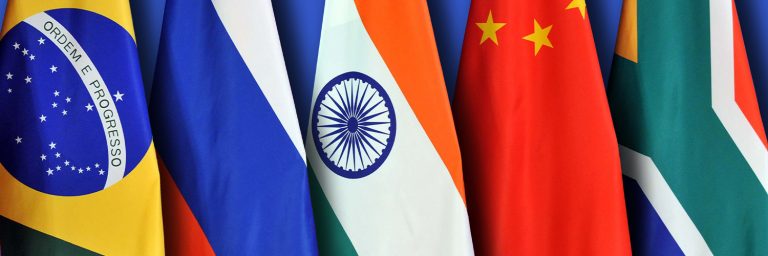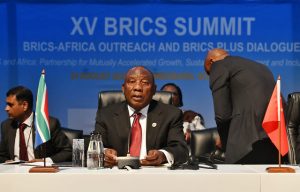
The BRICS (Brazil, Russia, India, China, and South Africa) bloc met for its annual leader’s summit in Johannesburg, South Africa on August 22–24, 2023. The highlight of the fifteenth summit was the agreement to admit six new member countries: Argentina, Egypt, Ethiopia, Iran, Saudi Arabia, United Arab Emirates, who will officially join the group in January 2024. Saudi Arabia and the United Arab Emirates, two of the world’s largest oil and gas exporters, supply most of China’s energy imports. Brazil, the last BRICS member to approve the expansion, specifically requested Argentina’s inclusion, which was reportedly a precondition for Brazil agreeing to the expansion as a whole. As the host, South Africa successfully negotiated the inclusion of two African countries, strengthening its ongoing efforts to promote integration, development, and growth through the African Continental Free Trade Area. All the BRICS leaders (especially Russian President via video) showed appreciation for the African Leaders Peace Mission’s proposal for a peaceful resolution to the Ukraine crisis.
 The fifteenth BRICS summit in South Africa will be remembered that decided on the transformation from the BRICS to the BRICS+ mechanism. thus, new horizons of possibility are created which has given a hope for better world with focus on peace and more inclusive development.The refusal to be drawn into a contest of competing global powers is a general perception in the Global South that should not be underestimated. The Global South’s economic growth potential and increasing security influence is going to overtake that of G-7 nations. Given that the next three G20 chairs are BRICS members, the Global South’s voice will be integrated into the G20 agenda. But once again, the 15th summit’s statement highlighted that while the BRICS seek to supplement and reform existing international institutions that are deemed to be unresponsive to their interests, it does not seek to challenge the existing institutions such as G-20.
The fifteenth BRICS summit in South Africa will be remembered that decided on the transformation from the BRICS to the BRICS+ mechanism. thus, new horizons of possibility are created which has given a hope for better world with focus on peace and more inclusive development.The refusal to be drawn into a contest of competing global powers is a general perception in the Global South that should not be underestimated. The Global South’s economic growth potential and increasing security influence is going to overtake that of G-7 nations. Given that the next three G20 chairs are BRICS members, the Global South’s voice will be integrated into the G20 agenda. But once again, the 15th summit’s statement highlighted that while the BRICS seek to supplement and reform existing international institutions that are deemed to be unresponsive to their interests, it does not seek to challenge the existing institutions such as G-20.
If not a new world order, the BRICS expansion is certainly an attempt at an alternative world order, one with a more sympathetic ear for the developing many versus the developed few. At this summit, the countries form Global South rejected the right of the United States and the European Union to impose restrictions on other countries’ foreign policy and economic activities. The BRICS nations aspires to reshape global governance by increasing trades in local currencies, reforming the United Nations and International Monetary Fund to better accommodate the aspirations of emerging countries, and aligning positions on global issues such as on agriculture, health, and sustainable development.
The expansion of the BRICS to a BRICS+ format and the adoption of guiding principles, standards, and procedures for the same, have potentially made the BRICS a more attractive institution for consensus-building and dialogue in the developing world. Even the profile of the new members suggest that the system is headed for creating a new equitable multipolar world order where countries from each region and continent get their voice heard. Only time will prove how these partners tap into the new systems of cooperation that the BRICS has been attempting to set up. The expansion signifies a growing alignment of geopolitical and economic agendas within the BRICS.
The decision to invite new members is a choice of development model for the next stage. The BRICS+ countries have seized their geopolitical moment and called for a united stand of emerging and developing countries against a world order and practice of international politics. The direction for the next decade has been determined. The challenges and opportunities presented by expansion will test the BRICS’ cohesion and effectiveness. As the report suggested, in 2024, Russia’s BRICS presidency will focus primarily on using local currencies and payment systems, steered by discussions among finance ministries and central bank governors.